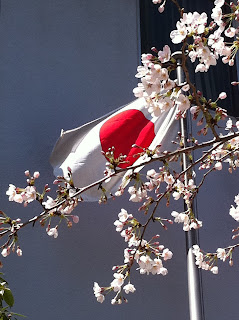Today we met a friend, Yusuke, who lives in Koriyama-shi, Fukushima which is located about 60km inland from the coastal line, the Tsunami impacted area, and the Fukushima #1 nuclear power plant.

It was an emotional meeting for us as he experienced the earthquake on March 11 at the kindergarten where he works. Yusuke is a very positive and caring guy, He looks forward and tries to help the environment & community. This impressed us very much.
On that day, when the 9.0 Earthquake happened, they took and carried all the kids outside to the playground. It was difficult to walk while the earth was shaking. Outside, it was still cold and a couple hours later it started to snow. All the electricity, Gas line & Water were dead, including phone lines.
Fortunately they did not have any damage from the tsunami but they had or still have difficult times from all the daily after shocks (there are 5-6 shocks per day, which he can feel) and the fear of radiation.
He said when the earthquake comes he can "hear" them coming, earth rumbles.
The life for the little children is not quite the same as before. Their board of education has decided not to let the kids play outside, all the swimming pools are closed, and having kids wearing masks all the time. It is difficult for them, but at least many of the kids are too young to understand the entire consequences of earthquakes and they are not panicking.
The worst is the fear of the radiation: they calculated if the situation doesn't change, they would be exposed to radiation 2-3 micro sievert per every hour, sums up in 1 year to 20-25 mili sievert. This is the reality but still, nobody is telling them how to prevent or what exactly will happen to their health. They hear nothing from the government or Tepco, no reliable information, he feels the government is not telling them enough.
My question to him was, of course: "Did you ever consider to leave your hometown?"
He answered to us: "Well, I am scared about this whole situation but I can not just leave. My family owns the kindergarten where the parents of these kids rely on. Some are doctors and nurses, some are member of the Self-Defense Forces. People need them and they need us. If I was there just alone, it would be easy, I would have left already."
This shows Japanese mentality and attitude which they should be very proud of:
Many of them care for others very much. They are brave and responsible for their families and community. I can not imagine any other country would be that strong (but to be fair, it is a unique situation and I hope that it will stay unique forever.)
Although, any other nations and governments might have reacted complete different to the situation, starting from evacuating further areas... but today I do not want to put the emphasis of this post on arguing on the Japanese governmental decision of the evacuation radius, but praise the Japanese gracious attitude and caring nature.
People there still have to live, they have to go to work to live their lives. Who would help them if they leave their city and go to else where... Government subsidy is only for people who lived in 30km evacuated zone.
What would you do? Suffer your own health and live like it is or suffer your own home and leave your family, friends and community behind?
I want to end this post with an outlook on our project.
Yusuke was very happy with our idea and engagement. He will help in Fukushima to identify the right schools and the right needs (what we should put into the cones). He said, that many kids from the evacuation zones are in schools all over Fukushima now and the schools are packed with kids, many don't have enough and schools are short of stationaries etc.
Yusuke thinks that many schools will be interested in receiving these school cones. Now he is looking forward to seeing many happy faces which he believes school cones will bring.




